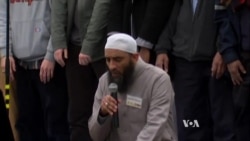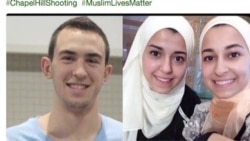Police continued to investigate the slaying of three Muslims in North Carolina Thursday.
The victims' family and friends insist it was a hate crime and are urging police to fully investigate.
A neighbor, Craig Stephen Hicks, 46, has been charged with first-degree murder in connection with the killings of Deah Barakat, 23, his wife, Yusor Abu-Salha, 21, and her sister, 19-year-old Razan Abu-Salha.
Chapel Hill police chief Chris Blue issued a statement saying investigators are exploring what could have motivated Hicks to commit such a "senseless and tragic act."
"We understand the concerns about the possibility that this was hate-motivated and we will exhaust every lead to determine if that is the case," Blue said.
Police said Wednesday they believe a long-simmering dispute over a parking space at the complex sparked the shootings, but Mohammad Abu-Salha, the father of the slain women, said he believed the shootings to be a hate crime.
He said Hicks had confronted his daughter and her husband a few times while carrying a gun on his belt.
On Thursday the FBI said it was opening its own preliminary inquiry, separate from local police investigations. A statement by FBI spokeswoman Shelley Lynch did not specify if the inquiry would include whether the shooting was a hate crime.
International attention
The case has garnered international attention and Turkish President Tayyip Erdogan criticized President Barack Obama, Vice President Joe Biden and Secretary of State John Kerry on Thursday for not speaking about the incident.
"If you stay silent when faced with an incident like this, and don't make a statement, the world will stay silent toward you," Erdogan said during a visit to Mexico.
The Turkish president, a devout Muslim who has been outspoken about what he sees as rising Islamophobia in the West, has strained relations with Obama on issues such as the war in Syria.
The White House said Wednesday that it would wait for the results of the police investigation before commenting on the killings in North Carolina.
A Twitter campaign, #MuslimLivesMatter, launched to draw national media attention to the tragedy, has attracted supporters from across the globe, many angrily claiming it was being ignored because the victims were Muslim.
One poster tweeted, "Muslims only newsworthy when behind the gun, not in front."
Campus vigil
The triple homicide has rocked the nearby University of North Carolina-Chapel Hill, where one of the victims, Barakat, was a student.
A spokesman for the school, Rick White, told VOA there was pain — and worry — on campus.
"As I talk to Muslim students and as I speak with leaders, as I have over the past few days from the Muslim community, I realize there is concern, there is fear about this, 'Could this attack happen again? Could this happen to me and my family?' " he said.
Watch video report from VOA's Arash Arabasadi:
Thousands of people gathered for a candlelight memorial at the university on Wednesday night to honor the victims.
"It was a good experience for people to be able to mourn, and to be able to share their stories, and then to be able to say, 'OK, move on. How can we make this a better place,?' " White added. "Because one of the things that came through loudly and very clearly during the vigil last night was: Don’t fight fire with fire. Don’t fight ignorance with ignorance. Go out and make the world a better place. That’s what we try to do every day here on campus. And, I think that’s what we’re taking away from this right now."
Calls for more investigation
Groups including the Muslim Public Affairs Council, the Council on American-Islamic Relations and the Raleigh-based Muslims for Social Justice have called for a federal investigation into possible hate crimes.
"I hope this terrible tragedy will be a turning point that brings the reality home that if we keep demonizing Muslims and equating their religion to terrorism, it will lead to more attacks," Manzoor Cheema, co-founder of Muslims for Social Justice, told Reuters.
Ripley Rand, a federal prosecutor whose district includes Chapel Hill, said Wednesday the shootings appeared to be an isolated incident, and not part of a campaign against the Muslim community.
Hicks, who was studying to become a paralegal, had posted anti-religious statements on his Facebook page, and recently posted a picture of a handgun.
But his wife, Karen, insisted during a news conference Wednesday the killings "had nothing to do with religion or the victims’ faith," adding that her husband was a strong supporter of gay and abortion rights.
Victims were community 'leaders'
Barakat, 23, was a second-year dentistry student at the university, while his wife was scheduled to join her husband as a dental student in the fall.
Abu-Salha was a student at North Carolina State University in Raleigh and was visiting the newlywed couple.
Liban Abdikarim, a Somali-American student who attended school with Barakat, told VOA's Somali service the trio were "leaders" in the Chapel Hill and Raleigh communities.
Barakat worked with a charity that provided dental supplies to the poor, and had launched a campaign to raise money for a humanitarian trip to Turkey to provide dental care to refugees from the civil war in Syria.
Liban H. Abdikarim, a Somali-American who knew Bakarat well and attended school with him, told VOA's Somali service news of the slayings came as a surprise.
"We were all shocked to hear the news of the passing of him and his wife and her sister — not only because they are innocent people and Muslims as well in the community but also because they were leaders in the community and they did a lot for Chapel Hill and Raleigh and the surrounding areas," Abdikarim said. "So it came as a shock to us because they were our leaders and now we have to look for someone else to look up to."
Shafi Khan, a co-founder of United Muslim Relief in Alexandria, Virginia, echoed that sentiment in an interview with The Associated Press.
“They did more in their college years to leave a legacy than other people do in their entire lifetime,” Khan said.
VOA's Urdu service contributed to this report. Some material came from Reuters, AP and AFP.
WATCH: Related video report by VOA religion correspondent Jerome Socolovsky







